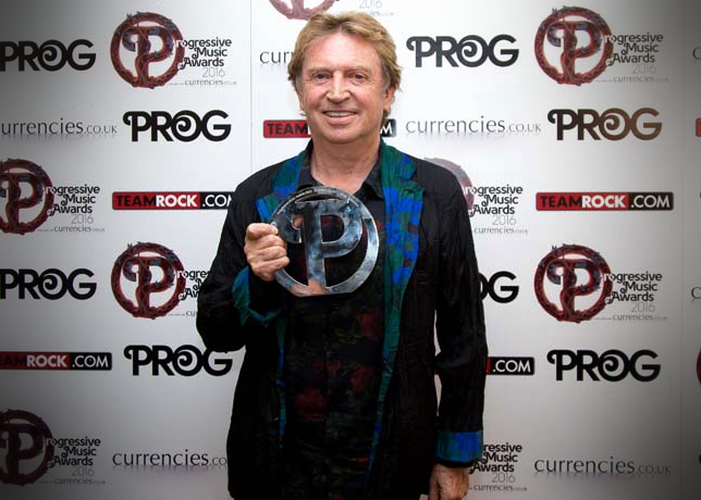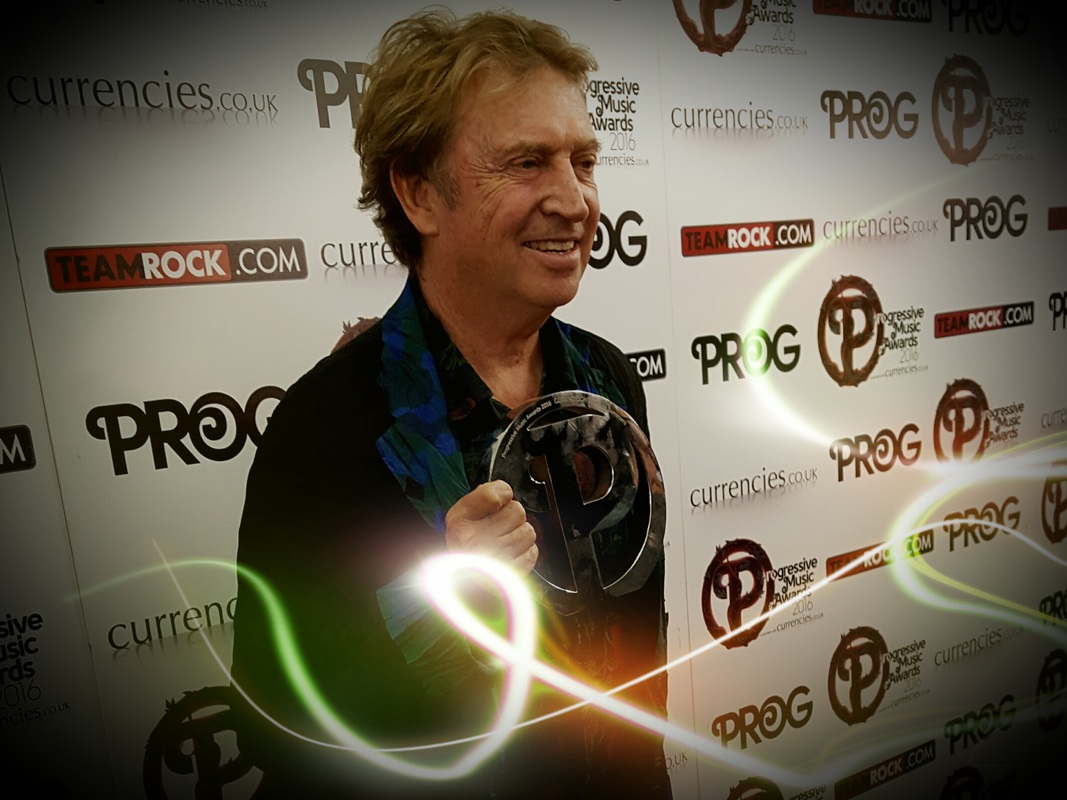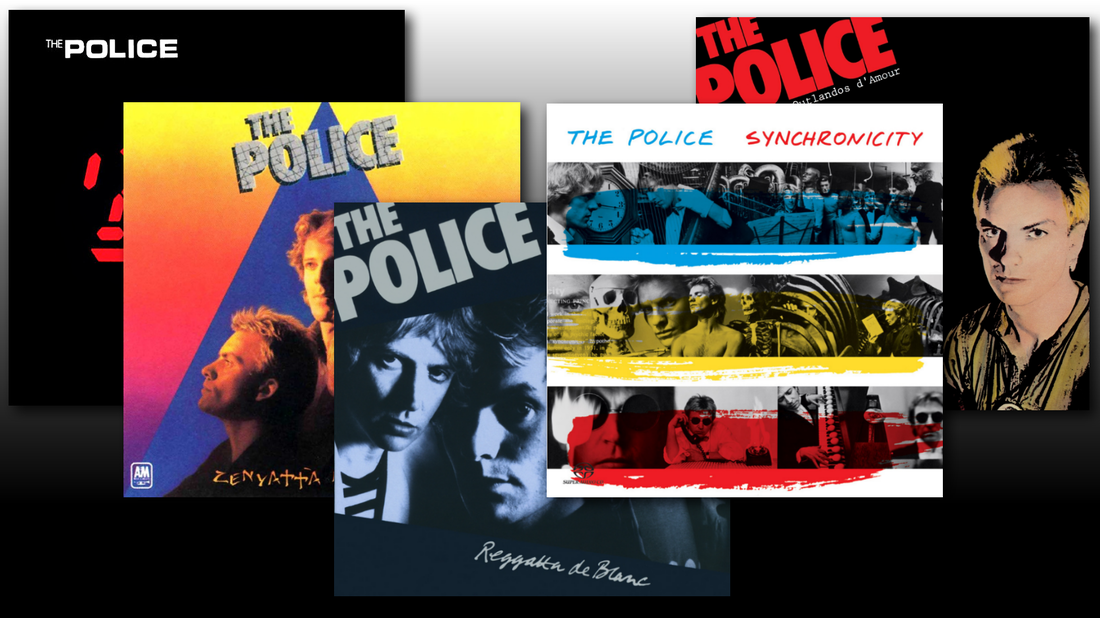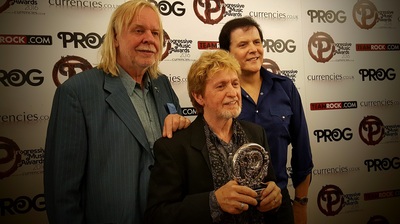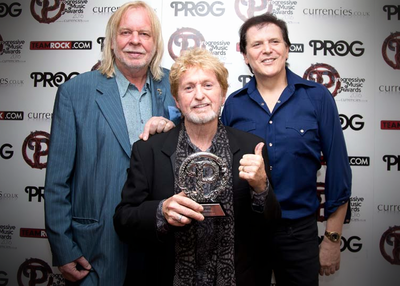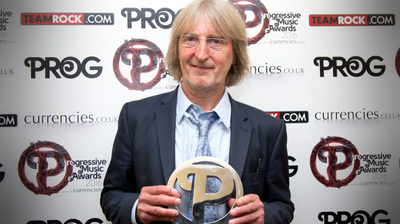|
Andy Summers needs little introduction. As a member of The Police with Sting and Stewart Copeland, the guitarist has sold over 75 million albums, won countless awards, and been inducted into the Rock And Roll Hall Of Fame. A respected artist in his own right, the Lancashire-born, U.S-based player still writes and records regularly, with 2015’s ‘Metal Dog’ his latest release. We caught up with Andy at The Progressive Music Awards in London to discuss his legacy, life in The Police, and that infamous ballad about a stalker. Ghost in the machine: Eamon O’Neill.
Hi Andy, how does it feel to have won the ‘Guiding Light’ award?
It feels great. I’m actually delighted to get this very heavy award. Does being named the ‘Guiding Light’ make you the torch-bearer for other bands? Well it is a bit! It’s like; “Oh my god! Am I going to live up to that?”! It’s not a real responsibility. I think it’s a very nice acknowledgement as someone who’s played for a very long time. I think ‘guiding light’ is the music itself, so there are a lot of guiding lights in the world; John Coltrane, for example, you could go on and on. It’s delightful to get it, and I also take it sincerely. I like it. You’re making new music all the time. What are you up to at the moment? I do. I live in Los Angeles, but basically my life is making music all the time. I put out a record last year, and I’m just finishing the follow-up to that, which will probably come out in February or March. You consider yourself a jazz musician now, don’t you? Yeah, I always did; not just now, but since I was thirteen. That’s where I started, and your teens are your formative years, and I don’t think you ever really leave them behind. I listened to all that American jazz, and that’s what I wanted to be, because for me, that was the really hip thing; rock as we know it, of course, it came along a bit later, so the hippest thing to be when I was a thirteen / fourteen year old was an American jazz musician. But you know, my playing has really came out of the way I phrase, the way I feel time; and I was very deeply influenced by that [American jazz scene]. Of course, as you go on, you pick up everything else anyway. So did you feel more constrained when you were playing what people might construe as rock or pop?
No, I mean, obviously the band I’m known for - The Police - was extraordinary because of the mix; the rather strange mix of the three guys who did it. But, it was a phenomenon; it was a very rare occurrence that three guys who play like that, got together. Sting and I and Stewart [Copeland] started playing, and Sting had grown up with a very similar musical background to me. He grew up as a jazzer, basically, but of course he could sing, so there was song writing stuff going on. But I had a pretty advanced harmonic knowledge. I’d been to college in California and studied guitar, so I found out pretty early on that I could play these weirder voicings; a bit more sophisticated than what was going on with other bands. And there was no problem with them - he [Sting]’d sing right through them coming out the other side, like Miles Davis playing the trumpet, and Stewart was doing the reggae or the rock. So in a way, it became this brilliant combination, which of course, with those amazing vocals and the volume you play at in rock, and using the Echoplex [tape delay effect] and the echo, certainly we had an extraordinary sound, and we didn’t sound like anybody else. The Police left a fantastic legacy of albums; yet there are a segment of people that might only know you from a few singles. It’s what we call ‘the curse of the early work’! Oh people go; “Roxanne” or things like that, and then you go; “you know, there’s an awful lot more; that’s not the best of it”. But of course, it always boils down to the most popular thing, and hey, you’re lucky if you get any of that. I’m very happy about that, but of course you can’t hang your hat up on that. If you’re a real, creative musician, you go on and on, and I’ve gone on for years; I’m on something like my fourteenth solo record, as well as many other projects. Does it surprise you that those songs resonate, and continue to resonate? It is kind of amazing – they don’t die. I travel all over the world, and you’ll be in an elevator in Beijing and you’ll hear ‘Roxanne’ or ‘Every Breath You Take’, and it’s really quite amazing. It hasn’t really gone away, and I’m very happy to say that, because; talk about travelling the world, and being in hotels, elevators, wherever you are in restaurants - you don’t hear the Stones all the time, and all you hear is The god damn Police! It’s like; “what happened?!” I guess, it’s in a certain sonic place that it just goes on and on and on, even more than The Beatles. So when The Police split up, did you think; “can I not get away from this!”? Well, it was so huge, and maybe young people don’t realise the band was sort of a phenomenon; it wasn’t just a rock band who had one hit - it was a worldwide phenomenon, like The Beatles, almost, in every country in the world, practically. You must have been desperate for a break from that hysteria in the end. I mean, it was a sort of, all enveloping period of eight years, where we were that popular. I mean, it was pretty insane, trying to live as a normal person. Really, it was ‘rock god’, taken on steroids. It was incredible, but there was of course, a come down period, and then it’s desolate when you come down from those highs and you have to adjust back to life. And this is when truly you need the guiding light of music, which for me, the way to psychologically recover from all of that was eventually going back in the studio and going; “well, I like this style of playing, and I’ve got to do this”, and that’s what pulled it all back together for me. We couldn’t talk about your legacy without mentioning ‘Every Breath You Take’. It’s one of the biggest royalty-earning songs in history. Is that bewildering to you?
It is pretty incredible, because I grew up with other aspirations, and when we started in The Police, I think we were just hoping to be ‘good’ and that’s it. The level it went to, we just couldn’t believe what happened to us; “you are going to be bigger than The Beatles”. It was quite incredible, and not that we got used to it, but suddenly you realise in fact, that you’re all the way there. The Police were a very progressive band. Looking back, when you got together, did it feel like a musical meeting of minds? Well, not immediately. The history of The Police is a little bit complex, particularly in the early stages because they started off with this other French guitarist [Henry Padovani]. But before I wasn’t really in the band I went to see them at the Marquee, and I did see that certainly Sting was a very larger than life character on stage, and Stewart was a hurricane on the drums, so I kind of got it. So you could see the potential even before you had joined? When I was playing with them at the beginning, actually, to be honest, I didn’t think they were very good; I felt like I was teaching them how to play; “no, not there! Stop there, you’re rushing! Hold it! Put an extra bar in there”, you know, I’m like, issuing all these instructions. I remember those early rehearsals, going home to my wife, saying; “they’re not very good, and they can’t play the blues!”. Of course, eventually, we got our shit together and it started to happen. When we started to rehearse a lot, every day in some filthy basement in London back in the day, it started to happen; “okay, we are ‘the band’ now, the three of us”. And then we started to play for hours on end, and the true sound began to emerge. It wasn’t there immediately, but then it started to come along. The truth was, we sort of knew what we were doing, but other people pointed it out to us, and we started to realise that we had a signature thing, that didn’t really sound like anybody else. Then we got it, and were able to do it to any piece of material, and we had our very original voice that emerged, not by absolute intention, but because that’s what our particular three-person chemistry produced. Looking back, what do you personally think was The Police’s finest hour? Well, I could say a lot of things; it might have been the first time we went to number one, or the first time we went to number one in the U.S. with ‘Every Breath You Take’. The album [1983’s ‘Synchronicity’] was number one for four months straight, and kept Michael Jackson out of the top spot. We had eight weeks at number one with ‘Every Breath You Take’, we played Shea Stadium [In New York] - those are moments that are hard to beat. Did you know when you were recording ‘Every Breath You Take’ that it was going to be so special?
Well, you know, it was crap until I played on it, and then it emerged. No one knew what to do with it. All the interaction between us at that particular point was really difficult. He [Sting] came in, and he had this song that actually sounded very prog rock; it sounded like Jon Anderson, with big rolling synthesiser chords, and it was ‘Every Breath You Take’. It didn’t sound anything like how we eventually did it, and there was a lot of argument about the drums and bass, and how to get the basic rhythm track down. We were not in a really good place, and it was difficult, and I think one day we were going through this bullshit, and Sting said; “go on then, go in there and kick it around”, which was very challenging. So they were all sitting there like that [cross arms and looks sternly], and I went in, and of course I had my Police guitar style down; it was very simple chord sequences, standard pop, and I laid that track down, virtually in one take. I just knew what to do with it; the licks. I had it right there, and they all stood up, and applauded. Finally, is there anything that you haven’t done in your career that you’d still like to achieve? We never did Glastonbury, and it irks me, because it’s one of the only things I haven’t done, and I would really like to do it. Do you think it’s too late for The Police to do it? No, not really. We’re all in good shape; Stewart lives near me in L.A., Sting’s in and out, you know. I don’t really know. We did the reunion tour, which was like the biggest tour of all time, and we never thought that would happen, but of course it was a phenomenal success. I wouldn’t say ‘never’, but I don’t want to get into like, wishful thinking; if it happens, and they pay me enough, I might do it! Like this interview? Like us on FaceBook and follow us on Twitter for regular updates & more of the same. |
|
Andy Summers
" The Police was pretty insane, trying to live as a normal person, when really, it was ‘rock god’, taken on steroids. It was incredible, but there was of course, a come down period, and it’s desolate when you come down from those highs and you have to adjust back to life."
© 2016 - 2024 eonmusic.co.ukContact: [email protected]
|

